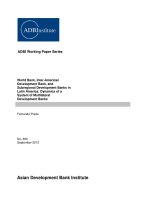A Bank Banking System Ukraine Account In Bank
Bạn đang xem bản rút gọn của tài liệu. Xem và tải ngay bản đầy đủ của tài liệu tại đây (1.5 MB, 24 trang )
Bank – is an organization, usually a
corporation, chartered by a state or
federal government, which does most or
all of the following:
- receives demand deposits and
time deposits, honors instruments drawn
on them, and pays interest on them;
discounts notes, makes loans, and invests
in securities; collects checks, drafts, and
notes; certifies depositor's checks; and
issues drafts and cashier's checks.
The Banking
System
of
Ukraine
Banking system – is the system
of banks in a country, including
commercial banks, merchant
banks and the central bank
Banking System of Ukraine
The modern banking system is the
most important sphere of national
economy of any developed
country. Banks are one of the main
components of the system of
market structure. The development
of their activities is a necessary
condition for the establishment of
market mechanism.
The banking system of Ukraine was founded
after the adoption by the Verkhovna Rada of
Ukraine in March 1991, the Law of Ukraine
“On Banks and Banking”. It is a two-level
and consists of the National Bank of Ukraine
and banks of various types and forms of
ownership including the state-owned ExportImport Bank and a specialized commercial
Savings Bank. Today, Ukraine has 159 banks,
15 commercial banks with mixed capital,
among which 5 banks have 100% foreign
capital, and registered as Ukrainian
economic entities. The National Bank of
Ukraine serves as the country's central bank
which pursues a uniform state monetary
policy to ensure the national currency
stability.
Commercial banks are formed as joint-stock
companies or as companies on an equal footing
with both legal and natural persons involved. The
range of commercial banks activities includes:
receiving deposits of enterprizes, institutions and
households, crediting of economic entities and
households, investments in securities, formation
of cash balance and reserves, as well as other
assets, cash and settlement servicing of the
economy, foreign exchange operations and other
services to natural persons and legal bodies.
The banks act in accordance with the
Constitution of Ukraine, the Laws of
Ukraine "On the National Bank of
Ukraine", "On Banks and Banking", the
Ukrainian legislation on joint-stock
companies and other economic entities,
as well as with the normative regulations
of the National Bank of Ukraine and their
Statutes.
According to the rating of banks by assets
and liabilities at the end of 2009 the best
are:
Bank account - an account held by an investor
at a financial institution. The financial institution
holds the money for the investor, leading to a
positive or credit balance, or loans money to
the investor, leading to a negative or
debit balance. Unlike a brokerage account,
which allows an investor to buy and sell
securities, a bank account is used for savings.
Types of bank accounts include savings
accounts and checking accounts.
What does an accountant do in
the bank?
He has to count everybody’s
money
in the bank and keep оn
а record
how much they spend.
Bank accountants, or an accountant for a bank,
perform most of the same functions of an
accountant for any other type of business.
Accounting is the classifying and recording of
financial transactions. This is always the
purpose and responsibility of the accountant
regardless of what type of company employs
him. However, banks have small procedural
differences that make them slightly different
from other businesses.
The bank
accountant
is
responsible for…
preparing the cash position of
his organization on a daily,
weekly and monthly frequency
the accountant prepares the
cash reports and provides them
to management for review
preparing or assisting in the
preparation of financial
statements at the end of each
month and quarter
general accounting
closing the branch or branches'
books at the end of each month
ensuring that the bank's accounting
practices, classifications and reporting
adheres to compliance and regulatory
standards
preparing and posting adjusting entries









